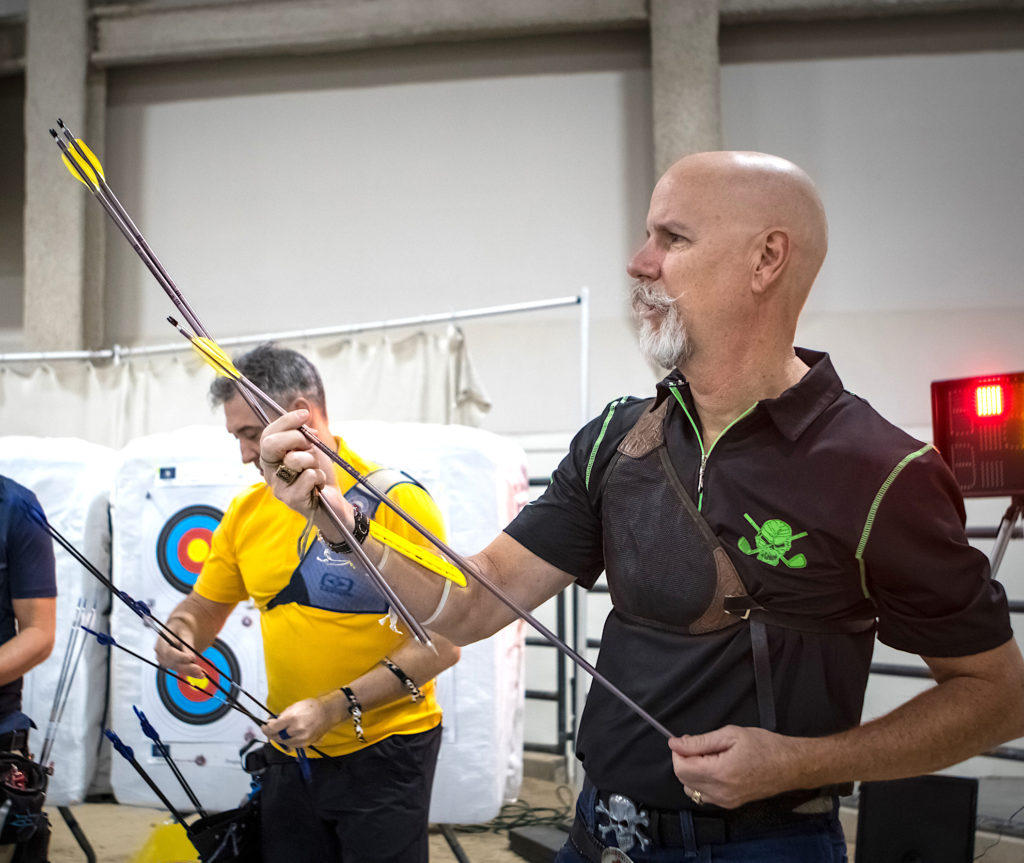Mimi Landström

Jay Barrs, the 1988 Olympic Champion in Seoul was the last champion to win shooting against the field. The 1988 Olympics was the last Games before the introduction of head-to-head elimination matches.
The Games were very different to how they are today, each archer shot a full 1440 round, followed by a ‘Grand FITA’ elimination round. Jay Barrs took the win over Korea’s Park Sung-Soo, by two points, 338-336.
What does it take?
It’s never going to be a simple answer, it takes years and years of hard work, dedication and hard decisions to make it. Even then it is not a given.
Jay Barrs grew up in a family of archers. Whilst living in Florida, there were tournaments pretty much every weekend, so from a young age, Jay had the competitive edge.
Jay was offered coaching from Dick Tone on a bow hunting trip at a young age, but living across the country from each other, Jay didn’t think it could work.
After being offered the scholarship to ASU, Jay phoned Dick up, confirmed he was going to the college and they discussed coaching. The following Sunday, Jay moved to Arizona to start his journey to becoming Olympic Champion.
Coaching
One key bit of advice Jay Barrs gives is to always trust your coach. If you cannot trust your coach, don’t work with them, it will never work.
People who want to get better but won’t change anything, people that have a coach but don’t what they are told because they don’t trust or believe, shouldn’t have a coach.
If you are not willing to change, why bother. Nothing will be different; you cannot improve and get better.
Making sacrifices
It’s often said that you will have to make great sacrifices to make it to a Games. Jay disagrees with this: and says: if you want the Games, if you want the win, you will make decisions to do what you want. That does not mean you’re making sacrifices because you are doing what you want.
Essentially, if you choose a path and you feel like you are making sacrifices, you have made the wrong choice! Jay only wanted to shoot his bow, to make the 1988 Games and win it, that was the end goal and everything he did was about that goal.
When a decision had to be made whether to go full time or finish the 13 hours of his degree, Jay chose shooting, in order to get to his gold medal.
Capacity
There’s a lot of discussion about how many arrows an Olympian needs to shoot a day or a week. Top Korean athletes today often shoot 2,500 arrows a week or more.
For Jay, it was a minimum of 300 arrows a day. He would never leave the field on less than 300 arrows and rarely took days off, simply because he really loved training. Why stop doing something you love?
A day in the life of Jay Barrs in the 1980s looked something like:
- Wake up at 8:30am
- Breakfast (usually Wheaties, apparently)
- Get to the range for 9/9:30am and shooting until lunch
- Head to coaches’ house for lunch and some coaching
- Back to the ASU range for afternoon shooting until dinner time
- Head to his parents for dinner
- Some days, he would even shoot up to 900 arrows because different people would get to the ASU range and ask to shoot together, so it ended being an extended training session – and he loved every minute of it.
- Working until 2am making plungers for Cavalier
Mental Management
Despite not being a believer in mental management, in early ’86, during a USA team meeting, Rick McKinney told the top ten men that he will always be able to beat them, until they change something.
Jay, although a sceptic, decided to test the mental management theories out. He wrote positive affirmations on 3×5 cards such as ‘I enjoy and am comfortable shooting distance scores of XYZ’ and kept them in places he could see them every day, or in his pocket. This was done for months on end, once one card was accomplished, a new one would replace it with a higher score.
Even though Jay didn’t think it would work, it did. The card that has stuck with him since ’86 was “I will be on the 1988 Olympic Team and win the gold medal”. It is now framed in his office as a present from his younger brother after he arrived back from the 1988 Games.
Overall
The fundamentals of becoming an Olympic Champion is to trust your coach: they know what they are doing. If you are not compatible, do not be afraid of change. You have to change to progress. Do not make sacrifices, make choices. If you are sacrificing, you do not want it enough. Shoot as much as you can and enjoy it. If you resent it, it isn’t right for you.
You have to enjoy it as much as you possibly can and spend as much time as you possibly can doing it. Use a solid mental management system, positive affirmations and improve upon them. Do not leave them the same, make them harder, progress – and get your goals!


If you meet Jay again, tell him I said congratulations on the gold medal and greetings from Austin, TX. Jay and I went to elementary school together.